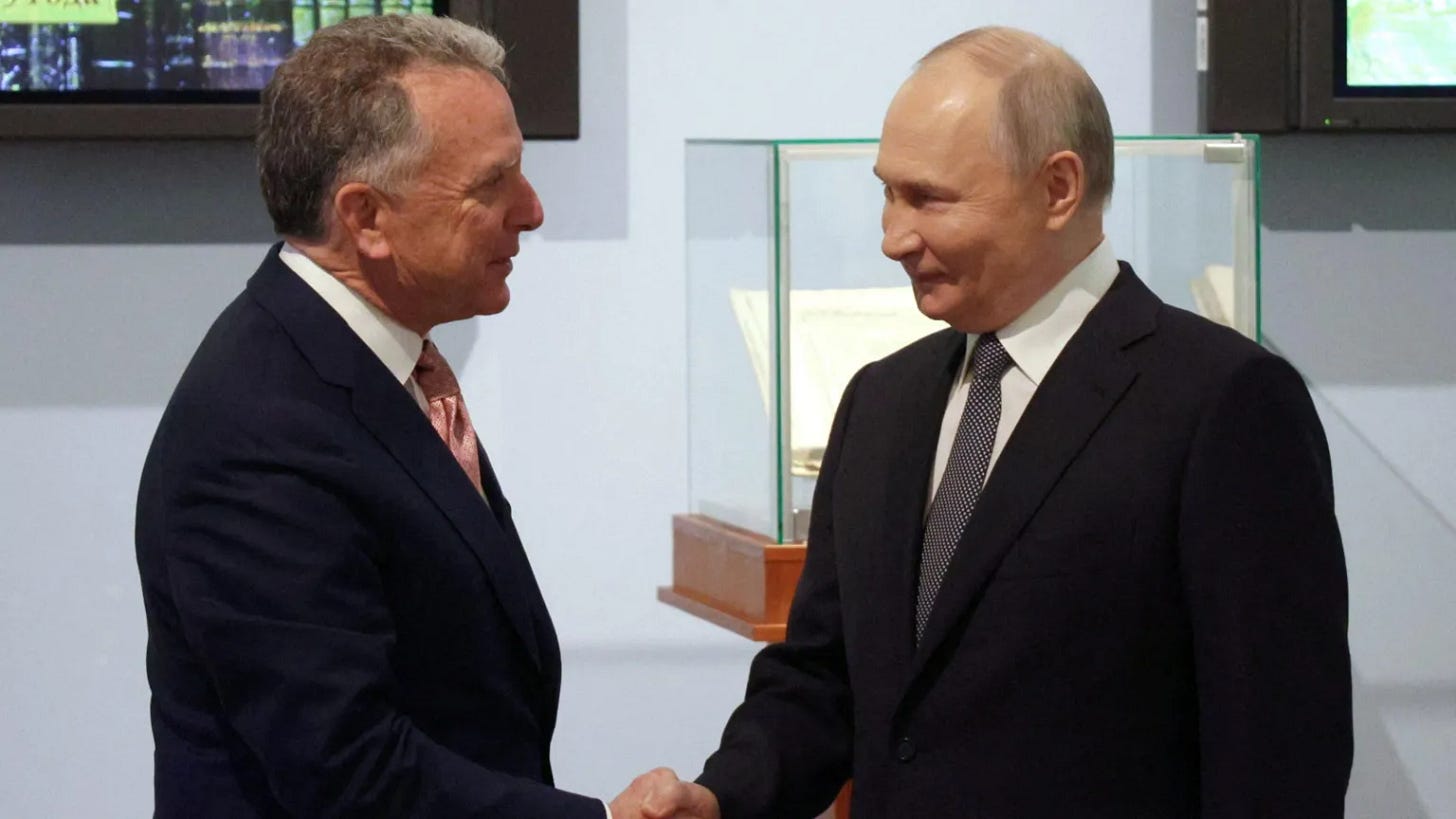Last week I was interviewed by an Algerian radio program about the Trump administration and the men he had selected as envoys to handle negotiations with Russia, Hamas, and Iran. They were asking specifically about Steve Witkoff and Adam Boehler. The interview (in French) is here, if you’re curious.
The conversation ended up turning around the question of the merits of Trump’s reliance on amateurs. Witkoff and Boehler are businessmen with minimal to no expertise with respect to foreign affairs and negotiations of the sort they have been asked to conduct. What do they know of Putin? Iran? Hamas? Nuclear programs? Nothing. Surely that’s a liability. Indeed, I’ve often thought that people like Putin or Iranian leaders would eat them for lunch. There’s nothing about being a successful businessman in New York or Florida that prepares one to deal with such people and such issues.
Putin wondering what wine pairs well with his lunch of Witkoff
There might, however, be a good side to this.
Trump clearly is frustrated with the “expert” class in Washington, DC, people he either fundamentally does not like (insecure?) or perhaps suspects because of the extent to which people “inside the Beltway” or in institutions like the State Department are beholden to various sets of orthodoxies that make sense to and are shared by fellow insiders, but mean little to outsiders. It is possible that getting things done requires shaking off all those orthodoxies. Breaking them, even.
A classic example of this is Trump’s deal with Morocco that brought about the “Abraham Accords” between Morocco and Israel.
The U.S. and Morocco have long been friends and even allies, although not treaty allies in the formal sense. Morocco brags that it was America’s first friend, for Morocco was the first country to recognize the United States. The two countries have been on very good terms ever since. Morocco after it became independent from France has solidly been in pro-American camp--in sharp contrast to its neighbor Algeria’s clear preference for the Soviet Union--and regards the anti-Western, anti-”colonialist” ideology of most of the Arab world as a threat. Morocco has no tolerance for Nasserite pan-Arab nationalism, for example, and is implacably hostile to Islamist tendencies such as Wahabism, Salifism, or the Muslim Brotherhood.
The one real point of contention between the U.S. and Morocco has been the American stance on Morocco’s claim of sovereignty over Western Sahara, a barren patch of desert that borders Morocco, Algeria, Mauritania, and the Atlantic Ocean. Spain colonized Western Sahara in 1884 and relinquished in 1976, prompting Morocco to grab the territory by virtual of (debatable) historical claims.
Morocco wants the international community to recognize its sovereignty over Western Sahara. The catch is that the region’s population, referred to as Sahrawis, don’t necessarily want to be ruled by Morocco, and in any case were never really asked. Some Sahrawis--backed by Algeria--formed a militant group known as the Polisario Front, which Morocco brands as a terrorist organization. Morocco and Algeria hate each other.
The kid did good
Washington’s response was to insist on its neutrality on the issue and insist on negotiations and a plebiscite. Morocco wants neither, and indeed Washington, for all its talk, never took concrete steps toward pressuring Morocco. American policy amounted to rhetoric in favor of a negotiated settlement (in favor of Sahrawis) with no intention ever to make that happen because, well, Morocco is our friend. Understandably, this satisfied no one, except perhaps for lawyers at the State Department. In their eyes, international law tended not to favor Moroccan claims. It also satisfied DC experts who appreciated the complexity of the issue and the pragmatic need to balance American relations with both Morocco and Algeria.
What Trump did was toss decades of reticence and legalism out the window. In effect, he was saying “international law be damned.” Besides, Moroccans are our buddies; Algerians not so much. Removing this one bone of contention between us and Morocco while also officializing Morocco’s long-nurtured good relations with Israel just made too much sense. It also was a way to end once and for all a long-standing issue that had long been an irritant.
The move sparked some protests in Washington among Think Tankers and policy wonks, and I am sure that State Department lawyers must have been apoplectic. I do not know if any resigned, but I would not be surprised if some did.
Who was the Trump Administration’s point man in the negotiations that brought about the deal with Morocco? Was it a veteran Republican policy hand? Perhaps a veteran of either George Bush’s cabinet? Hardly. It was Jared Kushner.
Indeed, the entire Abraham Accord initiative amounted to a rejection of decades of U.S. policy and diplomatic orthodoxies. Trump, rather than investing his energies in futile negotiations between Israel and Palestinians in the manner of Presidents Carter, Clinton, and George W. Bush, basically opted for a radical approach, one that no one inculcated in Washington orthodoxies could have approved. Trump thereby justifiably could claim that he achieved more for Middle East peace than his predecessors since Carter.
How does this translate to ongoing negotiation efforts related to Ukraine, Gaza, and Iran? It really is hard to say, and it is difficult to imagine how policy novices might succeed where their much better qualified predecessors failed. I still think someone like Putin would eat any novice for lunch. At the same time, I cannot say that turning to outsiders and non-experts is categorically a bad idea. Perhaps there even is cause for a sliver of optimism. Just a sliver.
If you like this, please consider a paid subscription to enable me to keep doing this. You also can toss some money in my tip jar. Also check out my book recommendations page on Amazon. Anything you buy helps support me.





